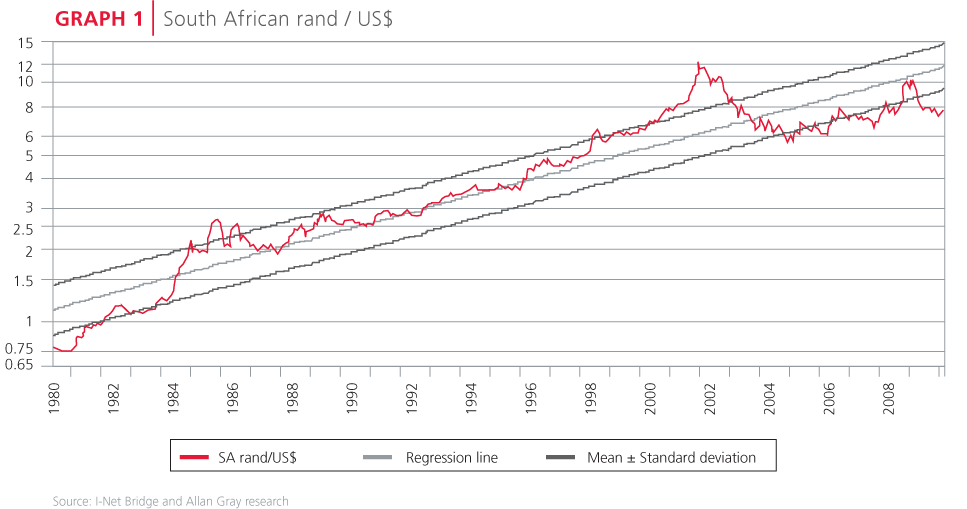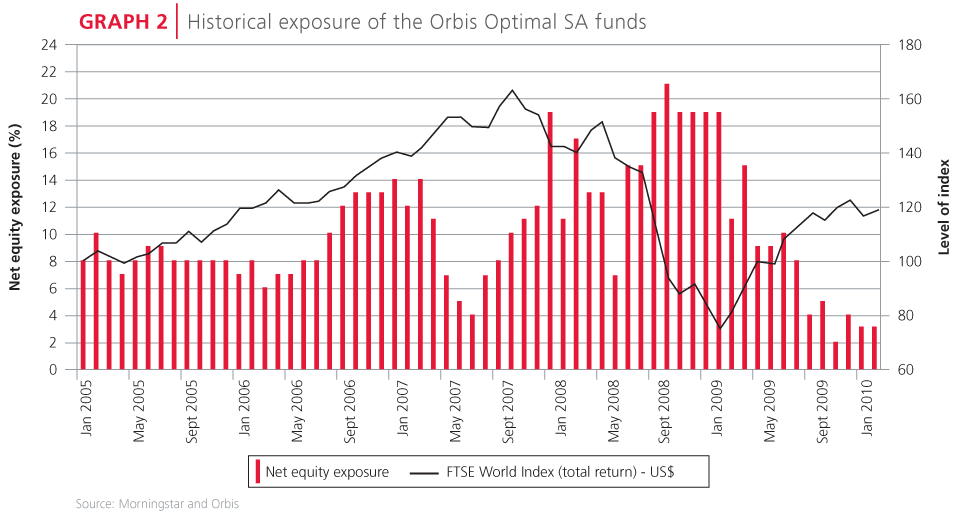EXECUTIVE SUMMARY: Allan Gray introduced its third rand-denominated offshore fund on 1 March 2010 bringing the total number of unit trusts to nine. The Allan Gray-Orbis Global Optimal Fund of Funds fills the 'offshore low-risk' space in our risk-profiled range of unit trusts. While we are aware that too much choice hampers an investor's decision-making ability, it has been evident since we launched the Global Fund of Funds in 2004 and the Global Equity Feeder Fund in 2005 that we do not have a rand-denominated offshore fund that caters for investors who wish to invest offshore but do not want to have a significant exposure to equities as an asset class. The persistent strength of the rand and the uncertainty in global equity markets has made the investment case for a low-risk offshore fund even stronger.
Our risk-profiled range of rand-denominated offshore funds
The three Allan Gray-Orbis Global funds all share certain characteristics.
The funds invest in one or more of the Orbis funds registered for marketing in South Africa. Orbis is Allan Gray's global asset management partner. The two companies share a common founder, investment philosophy and ethos.
An investor who uses his or her offshore allowance can buy foreign currency and invest directly into an Orbis fund. Investors who do not want to use their offshore allowance can invest in an Allan Gray-Orbis rand-denominated fund. The three different Allan Gray-Orbis Global funds invest in different underlying Orbis funds, or into the same funds but with different levels of exposure, thus achieving quite different risk and return profiles. This article focuses on the newest addition to the range, the Global Optimal Fund of Funds, which has a typical net equity exposure of between 0 and 20%, compared to a range of 40-75% net equity exposure for the Global Fund of Funds, or near 100% for the Global Equity Feeder Fund.
Investors should note that, because of foreign exchange control regulations, the amount Allan Gray can invest into the Orbis funds is restricted, and therefore there may be times when the rand-denominated offshore funds are closed to new investments.
Safer than equities, better than cash
The Allan Gray-Orbis Global Optimal Fund of Funds aims to achieve a higher rate of return than cash, with a high degree of capital stability in 'hard' currencies. To achieve these objectives, the Fund invests in a mix of the Orbis Optimal SA US$ Fund and Orbis Optimal SA Euro Fund.
(THE FUND) WAS CREATED FOR INVESTORS WHO WISH TO INVEST IN A LOW-RISK GLOBAL PORTFOLIO
The Fund is managed by Ian Liddle from Allan Gray, while the underlying funds are managed by Orbis. The Orbis Optimal SA funds were launched in January 2005, based on Orbis' successful absolute return strategy in running hedged portfolios since 1990. The funds seek capital appreciation on a low-risk global portfolio by investing in a focused portfolio of selected global shares which Orbis believes should provide relative outperformance in the long term. Orbis then uses stock market hedging to reduce the exposure to equity markets and hence the risk of loss on the portfolio.
The nature of returns
The strategy employed by the Fund is best explained by looking at the nature of the returns likely to be generated.
1. Exchange rate
The two funds are exposed to US dollars and euros respectively. The rand exchange rate relative to the dollar and the euro over time will affect the returns of the Fund. The euro versus dollar exposure will be defined largely by the benchmark. Graph 1 shows the rand against the US dollar for the last 30 years.
2. Bank deposit returns in euros / dollars
Selling stock market index futures contracts yields a return that is approximately the same as the prevailing return on cash. The underlying Optimal funds' expected returns are largely the return on cash, plus whatever value Orbis can add from stock picking (see point 3). Global interest rates are presently close to zero; historically, this has not been the case. For the 10-year period ending February 2010, US dollar bank deposits have been as high as 6.7% and have averaged 3% per annum. In the current near-zero interest rate environment, investors in the underlying funds rely almost entirely on Orbis' stock picking skill as the source of returns. The implication is two fold: absolute returns are likely to be lower than during periods of higher interest rates and there could be periods in which the Fund produces negative returns. The likelihood of negative absolute returns diminishes as global interest rates rise.
When thinking about absolute returns what is really important is the extent to which the Fund's returns are higher than inflation. The low level of interest rates reflects, to a large extent, low global inflation rates. So while nominal returns might be lower, real returns might not be.
3. Value added (or subtracted) by Orbis' stock picking ability
Exchange rates and interest rates may be beyond Orbis or Allan Gray's control but our commitment to produce pleasing long-term returns on behalf of investors will never waiver. Like Allan Gray, Orbis looks for shares considered to offer superior fundamental value. Since the global universe is much larger than the 318 listed shares on the main board of the JSE, Orbis maintains a database of 13 000 of the world's most marketable stocks. Quantitative techniques are applied to this information, some extending back over 35 years, to identify promising equities. From there, intensive qualitative research is done from a 'bottom-up' basis, considering a three- to five- year time horizon. Fundamentally attractive shares are then combined into a focused portfolio for the Fund.
The Fund maintains a substantial core level of hedging to reduce the risk of the prices of its equities declining as a result of a fall in stock markets. Orbis carefully selects stock market based derivatives that are expected to make the Fund's returns largely independent of the direction of global stock markets. When their research suggests that markets are overvalued and vulnerable, Orbis increases this hedging (i.e. decreases the net equity exposure). When markets present good value, Orbis lowers the hedging. At such opportunistic times, net equity exposure could be as high as 20% of the total Fund.


How the Fund is currently positioned
The latest asset allocation of the underlying funds has 88% invested in equities, with the remaining 12% in cash. The majority of the equity holding is hedged out, leaving a net equity exposure of only 3%. This is low relative to historical exposure of the Orbis Optimal SA funds (see Graph 2). During the recent market crash (September 2008 - February 2009) the Fund increased net exposure to around 20%, which placed it in a good position to participate in the market rally in the last three quarters.
Conclusion
The Allan Gray-Orbis Global Optimal Fund of Funds was created for investors who wish to invest in a low-risk global portfolio, with lower net equity exposure compared to that of the existing two Allan Gray-Orbis rand-denominated offshore funds.
If you are uncertain about the direction of global markets, but believe in Orbis' stock picking ability, seek the diversification benefits of uncorrelated returns relative to shares or bonds and want to take advantage of a possible future weaker rand, you may find our new fund a suitable investment.